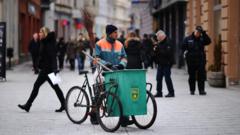In the Bosnian capital of Sarajevo, a distressing surge in rat populations has terrorized residents, leading to an outbreak of rat-borne diseases. Social media platforms are flooded with alarming images of numerous rats swimming in the Miljacka river and scattered around overflowing trash containers in the streets. Citizens have voiced their frustrations about the local authorities' inability to handle the sanitation crisis, including their failure to remove deceased animals from public spaces, including children's playgrounds.
Health professionals attribute the alarming increase in rat populations to the city’s inadequate pest control measures, resulting in a steep rise in reported cases of leptospirosis, commonly known as rat fever. In a single day, Sarajevo's largest hospital documented twelve new cases of the illness, on the heels of other infections reported earlier in the month. Leptospirosis typically spreads to humans via water or soil tainted with rodent urine or droppings, presenting symptoms that range from headaches and muscle aches to severe complications, such as jaundice and kidney failure in its acute form.
In response to the health crisis, local authorities in Sarajevo have officially declared an epidemic, allowing for emergency clean-up initiatives. Municipal teams equipped with disinfectants have been deployed to carry out an extensive “spring cleaning” of public areas and additional garbage collections have been planned. Local schools have also been instructed to enhance cleanliness in playgrounds, trim grass areas, and search their basements for rodent infestations.
This vigorous action starkly contrasts the previous two years when pest control efforts ceased entirely due to a failed tender process for extermination services. Consequently, the city has seen a proliferation of rats as well as packs of stray dogs roaming the streets, which has exacerbated the public health crisis.
Sarajevo Canton Health Minister Enis Hasanovic characterized the situation as a "communal crisis," citing the local authorities' failure to meet basic hygiene standards. Meanwhile, Sebija Izetbegović, former director of the Sarajevo University Clinical Centre, warns that if the rodent population remains unregulated, the city could face further health risks, such as hantavirus from the well-fed rats.
Fortunately, while untreated leptospirosis carries a fatality rate exceeding 50% for severe cases, the current epidemic has not yet resulted in any severe illnesses among those affected. This has provided a silver lining amidst growing concerns over public health in Sarajevo.






















